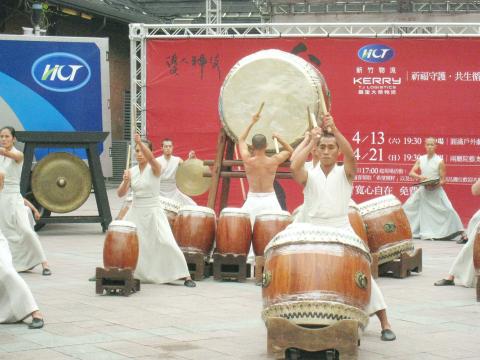Following on from their huge success in Kaohsiung and Taichung, U-Theater will be bringing their reworked version of Meeting the Bodhisattva (金剛心) to Taipei on Sunday for a free performance in the plaza of the CKS Memorial Hall (台北兩廳院藝文廣場). This year is the 25th anniversary of the establishment of U-Theater and it has been fully a decade since Meeting the Bodhisattva was released to universal acclaim, establishing the performance group on the international scene.
According to Leo Fu (傅祺棠), the public relations manager for U-Theater, the concert in Kaohsiung on March 16 at the Wei Wu Ying Center for the Arts (衛武營藝術文化中心) drew a crowd of 30,000, a record for U-Theater. Even larger crowds are expected for the Taipei show, as U-Theater celebrates not just its own achievements, but also uses the event to promote a message of environmental awareness and social harmony.
The three performances in Kaohsiung, Taichung and Taipei come as something of a surprise, following the announcement in September last year that the group would take a three-year break from their creative endeavors due to tensions between artistic and spiritual missions. This announcement had many fans worried the group would disappear from the artistic scene.

Photo: Ian Bartholomew, Taipei Times
The three concerts are sponsored by two of Taiwan’s largest courier companies, HCT Logistics (新竹貨運) and Kerry TJ Logistics (嘉里大榮物流). U-Theater founder and artistic director Liu Ruo-yu (劉若瑀) said she found it particularly appropriate that two competitors should come together to support this single endeavor, as this spirit of commitment to the wider social good that transcends commercial competition is an endorsement of the company’s spirit of striving for harmony in all aspects of life.
Meeting the Bodhisattva was one of the first works out of Taiwan to successfully combine theater and spiritual practice in a show with broad audience appeal. The production is meticulously choreographed and has strong ritual elements. For its simple narrative structure, it draws on tales related to Manjusri, a bodhisattva associated with transcendent wisdom who is often represented with a flaming sword in one hand and a scripture in the other. The story is about a man seeking self-knowledge and enlightenment, and combines furious struggle with meditational calm.
U-Theater is recognized as one of Taiwan’s most important artistic groups and regularly performs at the nation’s top venues, including the National Theater. On Sunday, the performance will be outside that theater, and it must be said that personally I have always found U-Theater at its best out of doors, when the resonance of the drums can radiate out into infinite space. Fu said that the venue at the CKS Memorial Plaza should be able to accommodate 15,000 people, and based on the response from Kaohsiung and Taichung, expect to find the plaza filled to capacity.
The performance proper will begin at 7:45pm on Sunday, but the associated Seeds of Hope (希望種籽) activity, in which U-Theater will be handing out seeds to encourage the planting of trees, and the Vegetarian for a Day (一日蔬食) activity, part of a program to combat global warming, will begin at 5pm. At 7:30pm, Liu said that she has invited monks from Dharma Drum (法鼓山), a Buddhist organization, to perform a ritual blessing. Similar blessings for peace and harmony were pronounced by Buddhist monks in Kaohsiung and by Presbyterian pastors in Taichung, underlining U-Theater’s non-denominational commitment that transcends all kinds of merely human divisions.

Not long into Mistress Dispeller, a quietly jaw-dropping new documentary from director Elizabeth Lo, the film’s eponymous character lays out her thesis for ridding marriages of troublesome extra lovers. “When someone becomes a mistress,” she says, “it’s because they feel they don’t deserve complete love. She’s the one who needs our help the most.” Wang Zhenxi, a mistress dispeller based in north-central China’s Henan province, is one of a growing number of self-styled professionals who earn a living by intervening in people’s marriages — to “dispel” them of intruders. “I was looking for a love story set in China,” says Lo,

It was on his honeymoon in Kuala Lumpur, looking out of his hotel window at the silvery points of the world’s tallest twin skyscrapers, that Frank decided it was time to become taller. He had recently confessed to his new wife how much his height had bothered him since he was a teenager. As a man dedicated to self-improvement, Frank wanted to take action. He picked up the phone, called a clinic in Turkey that specializes in leg lengthening surgery — and made a booking. “I had a lot of second thoughts — at the end of the day, someone’s going

In the next few months tough decisions will need to be made by the Taiwan People’s Party (TPP) and their pan-blue allies in the Chinese Nationalist Party (KMT). It will reveal just how real their alliance is with actual power at stake. Party founder Ko Wen-je (柯文哲) faced these tough questions, which we explored in part one of this series, “Ko Wen-je, the KMT’s prickly ally,” (Aug. 16, page 12). Ko was open to cooperation, but on his terms. He openly fretted about being “swallowed up” by the KMT, and was keenly aware of the experience of the People’s First Party

Standing on top of a small mountain, Kim Seung-ho gazes out over an expanse of paddy fields glowing in their autumn gold, the ripening grains swaying gently in the wind. In the distance, North Korea stretches beyond the horizon. “It’s so peaceful,” says the director of the DMZ Ecology Research Institute. “Over there, it used to be an artillery range, but since they stopped firing, the nature has become so beautiful.” The land before him is the demilitarized zone, or DMZ, a strip of land that runs across the Korean peninsula, dividing North and South Korea roughly along the 38th parallel north. This